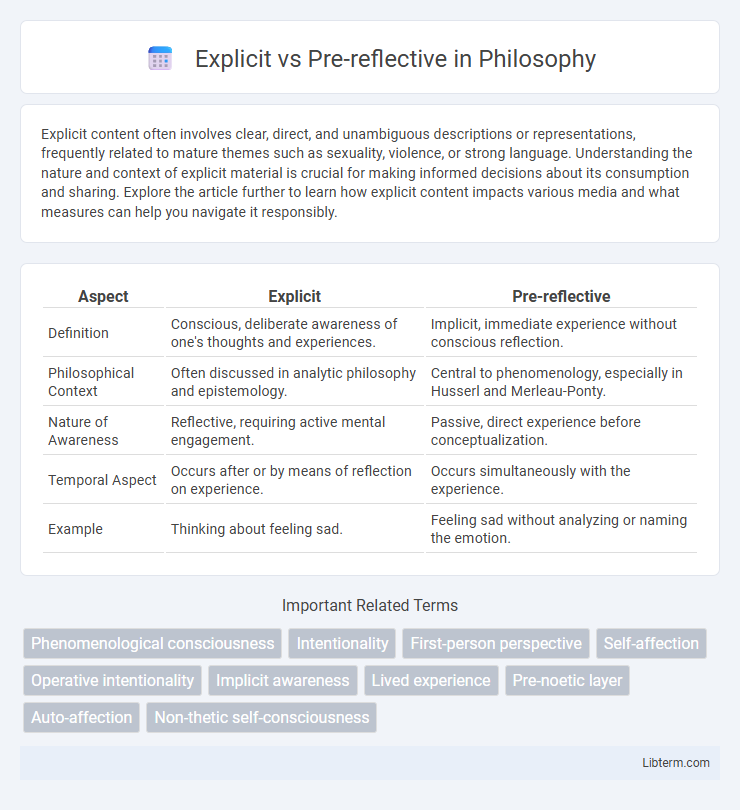Explicit content often involves clear, direct, and unambiguous descriptions or representations, frequently related to mature themes such as sexuality, violence, or strong language. Understanding the nature and context of explicit material is crucial for making informed decisions about its consumption and sharing. Explore the article further to learn how explicit content impacts various media and what measures can help you navigate it responsibly.
Table of Comparison
| Aspect | Explicit | Pre-reflective |
|---|---|---|
| Definition | Conscious, deliberate awareness of one's thoughts and experiences. | Implicit, immediate experience without conscious reflection. |
| Philosophical Context | Often discussed in analytic philosophy and epistemology. | Central to phenomenology, especially in Husserl and Merleau-Ponty. |
| Nature of Awareness | Reflective, requiring active mental engagement. | Passive, direct experience before conceptualization. |
| Temporal Aspect | Occurs after or by means of reflection on experience. | Occurs simultaneously with the experience. |
| Example | Thinking about feeling sad. | Feeling sad without analyzing or naming the emotion. |
Understanding Explicit and Pre-reflective Awareness
Explicit awareness involves conscious, deliberate reflection on experiences, enabling individuals to analyze and articulate their thoughts and emotions clearly. Pre-reflective awareness occurs prior to conscious thought, characterized by an immediate, non-conceptual engagement with one's sensations and perceptions. Understanding the distinction between explicit and pre-reflective awareness is essential in cognitive science and phenomenology for exploring how humans process and interpret their experiences.
Defining Explicit Consciousness
Explicit consciousness refers to the fully articulated awareness individuals have when they deliberately focus on specific thoughts, sensations, or experiences, enabling reflective self-examination and verbal expression. It involves higher-order cognitive processes, such as attention, memory, and reasoning, which allow an individual to consciously recognize and describe their mental states. This form of consciousness contrasts with pre-reflective awareness, which is immediate, non-conceptual, and operates without explicit self-reflection or linguistic representation.
Exploring Pre-reflective Experience
Pre-reflective experience refers to the immediate, non-conceptual awareness one has before any cognitive reflection occurs, embodying the raw, lived sense of being in the world. Exploring pre-reflective experience reveals how consciousness operates at a foundational level, influencing perception, embodiment, and intentionality without active analysis or articulation. Understanding this dimension enhances phenomenological research and deepens insights into how individuals engage with reality beyond explicit, reflective thought.
Key Differences Between Explicit and Pre-reflective
Explicit consciousness involves deliberate, reflective awareness where one actively thinks about experiences, allowing for verbal articulation and metacognitive evaluation. Pre-reflective consciousness operates at a tacit level, where individuals are immersed in experience without self-reflective thought, embodying an immediate, non-conceptual awareness of phenomena. The key difference lies in explicit awareness requiring conscious reflection, whereas pre-reflective awareness remains implicit and foundational to lived experience.
The Role of Self-awareness in Explicit and Pre-reflective States
Self-awareness plays a critical role in differentiating explicit from pre-reflective states, with explicit self-awareness involving conscious, deliberate reflection on one's thoughts and experiences. In pre-reflective states, self-awareness operates tacitly, allowing individuals to engage with the world without consciously analyzing their own mental processes. This distinction highlights the neural and cognitive mechanisms underpinning reflective consciousness versus immediate, experiential awareness.
Explicit and Pre-reflective in Cognitive Science
Explicit cognition involves conscious awareness, deliberate reasoning, and verbal reportability, enabling individuals to articulate their thoughts and decisions clearly. Pre-reflective cognition operates below conscious awareness, guiding automatic, intuitive behaviors without requiring deliberate reflection or verbalization. Cognitive science studies these modes to understand how conscious and non-conscious processes interact in perception, decision-making, and self-awareness.
Examples of Explicit vs Pre-reflective in Daily Life
Explicit awareness occurs when you consciously recognize and articulate your emotions, like noting anxiety before a presentation, whereas pre-reflective awareness is the immediate, nonverbal experience of feeling nervous without deliberate thought. In daily life, explicitly deciding to practice mindfulness involves reflective awareness, while the automatic feeling of tension in your body during stress exemplifies pre-reflective experience. These distinctions highlight how explicit and pre-reflective awareness shape our interaction with emotions and sensations moment-to-moment.
Implications for Philosophy of Mind
Explicit self-consciousness involves reflective awareness of one's mental states, enabling meta-cognition and intentional analysis. Pre-reflective self-awareness operates as an immediate, non-thematic sense of subjectivity underlying experience without deliberate self-reference. The distinction influences debates in philosophy of mind regarding the nature of consciousness, selfhood, and the conditions for self-awareness in phenomenology and cognitive science.
Relevance in Psychological Research
Explicit cognition involves conscious awareness and deliberate reflection on thoughts or experiences, which allows researchers to measure and analyze self-reported data and verbal expressions. Pre-reflective consciousness operates beneath conscious awareness, capturing automatic, intuitive processes crucial for understanding implicit biases and nonverbal behaviors in psychological studies. Emphasizing the relevance of both modes enhances psychological research by integrating subjective self-reports with objective implicit measures, improving accuracy in assessing mental states and cognitive processes.
Future Directions: Studying Explicit and Pre-reflective Experiences
Future research on explicit and pre-reflective experiences should emphasize neurophenomenological methods that integrate first-person subjective reports with brain imaging data. Exploring the temporal dynamics of conscious awareness can reveal how explicit reflection emerges from pre-reflective processes, advancing understanding of self-awareness and cognitive control. Developing real-time experimental paradigms and computational models will deepen insights into the interplay between implicit and explicit layers of experience.
Explicit Infographic

 libterm.com
libterm.com